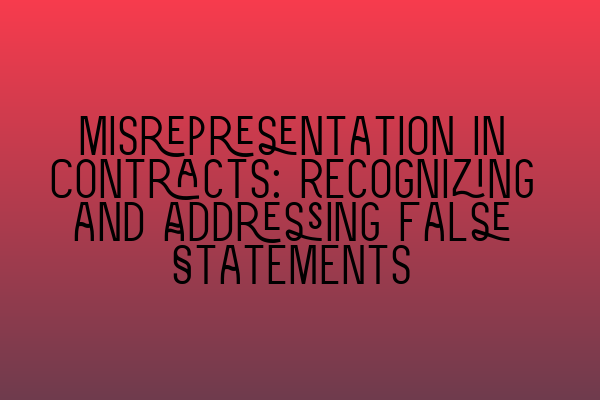Misrepresentation in Contracts: Recognizing and Addressing False Statements
When entering into a contract, it is crucial to ensure that all parties involved are providing accurate and truthful information. However, there are instances where false statements or misrepresentations may occur, leading to potential legal consequences. In this article, we will explore the concept of misrepresentation in contracts, its various forms, and how to address them.
What is Misrepresentation?
Misrepresentation refers to the act of providing false or misleading information during the negotiation or formation of a contract. It can occur in different forms and can be unintentional or deliberate. Regardless of the intent, misrepresentation undermines the fundamental principle of contractual agreements, which is based on the exchange of accurate and reliable information.
Types of Misrepresentation
Understanding the different types of misrepresentation is crucial for recognizing and addressing false statements in contracts. Here are the three main categories:
- Innocent Misrepresentation: Innocent misrepresentation occurs when a person gives false information while genuinely believing it to be true. In such cases, the person making the statement may not have intended to deceive the other party. However, even innocent misrepresentation can still lead to legal consequences.
- Negligent Misrepresentation: Negligent misrepresentation happens when a party makes a false statement without exercising reasonable care or conducting a proper investigation to verify the accuracy of the information. Although it may not be intentional, the party can be held liable for their negligence.
- Fraudulent Misrepresentation: Fraudulent misrepresentation is the most serious type of misrepresentation, involving the deliberate act of providing false information with the intention to deceive the other party. It is a deliberate act of dishonesty and can result in severe legal repercussions.
Recognizing Misrepresentation
Identifying misrepresentations requires careful review and analysis of the contract and the statements made by the parties involved. Here are some signs that may indicate possible misrepresentation:
- Unequal access to information
- Unusually favorable terms for one party
- Unrealistic promises or guarantees
- Contradictions within the contract or accompanying documents
- Verbal statements that do not match the written contract
It is essential to thoroughly review all the details and seek legal advice if you suspect any misrepresentations, as prompt action can help protect your rights and interests.
Addressing Misrepresentation
When dealing with misrepresentation in contracts, it is crucial to take appropriate steps to address the issue. Here are some measures to consider:
- Communication: Start by having open and honest communication with the other party to address the misrepresentation. Discuss your concerns and attempt to find a resolution that is fair for both parties.
- Legal Advice: Consult with a contract law solicitor who specializes in addressing misrepresentation issues. They can provide guidance and help you understand your rights and options.
- Negotiation or Mediation: Consider entering into negotiation or mediation to resolve the dispute outside of the court system. These alternative dispute resolution methods can be effective in achieving a mutually acceptable resolution.
- Legal Action: If all attempts to resolve the issue fail, you may need to consider legal action. Your solicitor can guide you through the process and help protect your interests in court.
It is important to remember that each case of misrepresentation is unique, and the appropriate course of action may vary depending on the circumstances. Seeking legal advice tailored to your specific situation is crucial.
Prevention is Better than Cure
While it is crucial to know how to recognize and address misrepresentation, preventing it from occurring in the first place is always the ideal approach. Here are some steps you can take to minimize the risk of misrepresentation in contracts:
- Conduct thorough due diligence and research before entering into any agreement.
- Document all relevant information and ensure that it is accurate and complete.
- Obtain professional advice or opinions when necessary.
- Seek legal assistance in reviewing and drafting contracts to ensure clarity and accuracy.
- Be cautious of verbal statements and insist on having all important terms and conditions in writing.
By taking these preventive measures, you can minimize the likelihood of encountering misrepresentation issues and protect yourself and your business.
Remember, misrepresentation in contracts is a serious matter that can have significant legal consequences. It is essential to have a solid understanding of the various types of misrepresentation, recognize the signs, and take appropriate action when necessary.
If you would like to further develop your contract law knowledge or prepare for the SQE (Solicitors Qualifying Examination) exams, consider checking out the following related articles:
- SQE 1 Practice Exam Questions
- SQE 1 Practice Mocks FLK1 FLK2
- SQE 2 Preparation Courses
- SQE 1 Preparation Courses
- SRA SQE Exam Dates
By staying informed and continually expanding your legal knowledge, you can navigate the complexities of contract law with confidence.
